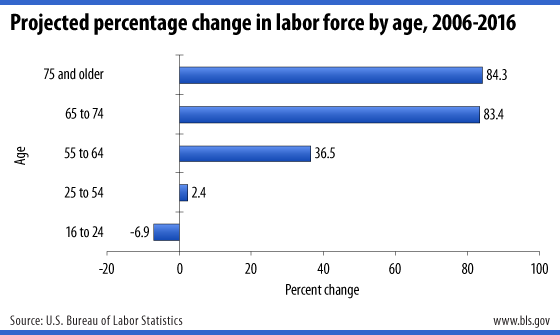Overheard from one of the talking heads on CNBC this morning in the context of a discussion on the potential candidates for new CEO of Microsoft: (Note: I am paraphrasing the below exchange as best as I can from memory, as I was still a bit groggy waiting for the coffee to brew).
Host - Now how do you feel about Alan Mulally from Ford to be the next Microsoft CEO?
Expert guest - I think he'd be fantastic. He's done an amazing job at Ford, he has ties to the Seattle area, and would be able to turn around that company.
Host - But is he able to take that job and do it well for say another 7 years? Isn't he something like 68 years old now? (Note: Mr. Mulally was born on August 4, 1945 making him, indeed, 68 years old).
Expert guest - Sure he could. Why not? 70 is the new 50 after all.
(Chuckles around the table).
Except that it really is not all that funny.
The issue really isn't whether or not Alan Mullally would in fact make an excellent CEO for Microsoft and even at 68 years old still has the energy, drive, good health, mental agility, etc. necessary to succeed in such a big, complex job.
Rather, to me, what made me stop what I was doing and shake off my still-waiting-for-the-coffee early morning stupor was the really casual way in which none of the show's other participants really pushed back on the notion that '70 is the new 50'.
Is that really accurate? And is that how folks working today need to contemplate their working lives? Planning for a future where you will need to (or be expected to), be churning out the widgets at 70?
To me this is not some long term trend playing out over decades and decades, it seems much more like a one generation shift.
I suspect most of the folks reading this blog are in what we'd consider their 'prime' working years, probably between 35 and 55. And probably most of the folks can look back just one generation, to their parents, and see how the arc of their professional lives looked much, much different and sets up in contrast to the '70 is the new 50' point of view.
And since I don't know your specific story, I will share mine, (and assume it resonates, if not, please share in the comments).
My Mom was mostly a stay at home Mom until the kids were older and two of the three of us were out of the house. She then had a few different part-time jobs, a couple that she really liked, but then opted out of the workforce for good at about 55 or so.
My Dad, after leaving the Army, worked for one company his entire professional career, held various management and administrative roles, and retired for good at about 62 years old, (and was 'ready' to retire way before that).
I suspect the stories of your parents are similar. And I'd also suspect at least for many of us today, we expected our stories to play out along similar lines. But it does seem that, in just one generation or so, these expectations, borne out of a combination of economic necessity and some measure of changing cultural and societal pressures, are being rapidly altered.
The talking head on CNBC might have been (kind of) joking when he said '70 is the new 50.'
But let's pretend for a moment it was not a joke, and it really is more representative of how more and more of our careers will look.
Are we ready for that?
Are our organizations ready for that?
Will you ever see your Grandkids while they are still young enough to spoil?